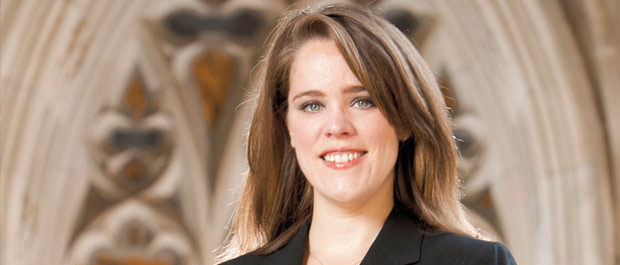When Angela Mace A.M. ’08 sat down at a piano in the Nelson Music Room in early September, she awakened a forgotten bit of musical history. The sonata she played, a lyrical nineteenth-century composition known as Ostersonate, or “Easter Sonata,” had been performed before— but possibly never under the name of its rightful composer, Fanny Hensel.
Hensel, the elder sister of German composer Felix Mendelssohn, was perhaps every bit as talented as her brother, but gender stereotypes prevented her from earning wide recognition as a composer. For nearly 200 years, the sonata, written in 1828, has widely been attributed to her brother, even though Hensel’s letters and diary describe the sonata as hers.
Mace began unwinding the musical mystery as part of her doctoral research in musicology. After studying Hensel’s papers in Berlin, she tracked down an original manuscript of the sonata at a private collector’s home in Paris. In 2010, she traveled to Paris to inspect the score, which was not signed by its author. But Mace was able to match its handwritten title to Hensel’s letters and diary, proving Hensel composed the piece.
“Finding the manuscript is definitely one of the most exciting moments of my career so far,” says Mace.

Hensel: Finally getting her due (Credit: Wikimedia Commons)
But the discovery is more than just a historical footnote, says music professor R. Larry Todd, who has written a biography of Mendelssohn and advised Mace on the research. He says the sonata, which had garnered little attention in the classical-music world, belongs in the company of Beethoven, Schumann, and Liszt.
“We usually think of nineteenth-century European music as familiar enough terrain,” he says. “Occasionally, though, a forgotten or lost composition comes to light, and the circumstances of its history prompt a reappraisal of the conventional wisdom.”
And that’s why Mace is expecting that her performance of Hensel’s Ostersonate will be the first of many. “This discovery helps us re-evaluate who Fanny was as a composer,” she says, “and to put her in place next to her brother as one of the major composers of the nineteenth century.”

Share your comments
Have an account?
Sign in to commentNo Account?
Email the editor